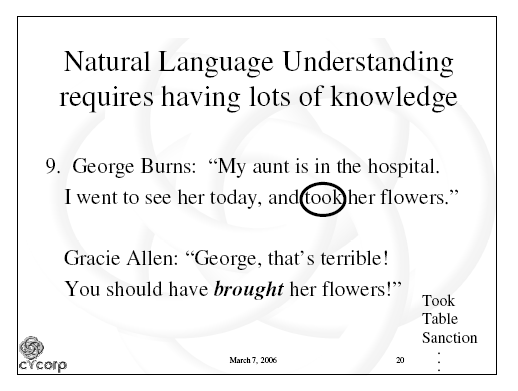January 11, 2007
Common Sense
 We'd all be a lot safer, I suspect, if the intelligence functions of the Department of Homeland Security were turned over to the alumni-association industry. Those people are efficient, all-knowing and politely relentless. As I've moved through life since obtaining an MIT degree in 1975, I've apparently been adopted by the local MIT Club of every region that I've ever lived in, and every one of them sends me multiple email reminders of their frequent and interesting events, none of which I've ever actually attended.
We'd all be a lot safer, I suspect, if the intelligence functions of the Department of Homeland Security were turned over to the alumni-association industry. Those people are efficient, all-knowing and politely relentless. As I've moved through life since obtaining an MIT degree in 1975, I've apparently been adopted by the local MIT Club of every region that I've ever lived in, and every one of them sends me multiple email reminders of their frequent and interesting events, none of which I've ever actually attended.
The most recent flurry of alumnospam advertised a lecture tour by Henry Lieberman from the Media Lab, on the topic "Beating Common Sense into Interactive Applications". The various emails in the series featured catchy graphics, like the one on the right, and copy like this:
Would your computer understand the joke? Would it have more 'common sense' than Gracie? Not now, but the work in the Software Agent's Group lead by Henry Lieberman is working to bridge that gap. Creating and linking common sense knowledgebases to the problems of interactive applications.
This emerging technology allows computers to know things indirectly. Not by facts or structures in the application. But by inferring it from the knowledge of human experience that becomes 'common sense'. [...]
This technology is at the core of the next generation of web functionality…and this is your chance to here about it from one of the researcher's most linked on the web. And a chance to network with other alumni of course!
I'm tempted to say that failure to understand old comedy routines is not my computer's biggest current problem; but that would be a cheap shot. So what I'll say instead is that someone should do a magazine piece on the way that classical AI, driven underground by the ascendency of Machine Learning, has morphed into the Semantic Web and related research.
Earlier LL posts on related themes:
"AI is brain dead" (7/31/2003)
"Ontologies and arguments" (11/11/2003)
"Borges on metadata" (11/13/2003)
"Trees spring eternal" (11/23/2003)
"The AI gnomes of Zurich" (11/26/2003)
"Retrospective: the semantics of harpers.org" (1/31/2004)
"Thesauri, SKOS and terminology variation" (3/16/2004)
"The passivator" (4/16/2004)
"Their GO-mark'd love" (10/23/2004)
"EMELD" (7/2/2005)
[Neal G. writes:
What struck me about your Burns & Allen post is that at first I didn't really get the joke. I thought that Gracie was just being a prescriptivist who thinks that "take" shouldn't be used synonymously with "bring."
It took me a minute or two to realize that the joke really turned on an ambiguity in how the word "her" was being used—as a possessive determiner or as an indirect object. (I apologize if my terminology isn't exactly right; I'm not a linguist, I just play one on TV). What George intended his sentence to mean was "I took flowers to her," but what Gracie heard it as something like "I took flowers belonging to her out of her room." The joke wouldn't have worked if the person in the hospital had been a man, because each of the two functions is expressed in a different word (lexeme? lexical item? whatever): "him" and "his." That means the ambiguity can't arise in the first place.
The fact that I didn't pick immediately get the joke made me wonder if maybe using "take" as synonymous to "bring" wasn't as well established back when Burns & Allen were doing this bit as it is now. Because if you don't pick up on the ambiguity at least subconsciously, the joke isn't very funny.
Of course, the other possibility is that I was just being dense.
(Let me say first that despite Neal's diffidence about terminology, the logic of his analysis is exactly correct.)
I don't think that the relevant aspects of the sense and usage of bring and take were any different 50 years ago than they are today. I don't have any information about relative frequency, but it's clear that the construction "take <someone> <something>", in the sense of transferring it to them as a gift, has been part of the English language for well over a century. For example, the OED contains these examples (from the entries for shine, preserve, and medlar, respectively):
1847 ROBB Squatter Life (Bartlett 1860), To make a shine with Sally, I took her a new parasol.
1854 MRS. GASKELL North & S. xx, Perhaps, I might take her a little preserve, made of our dear Helstone fruit.
1881 R. D. BLACKMORE Christowell xxxvi, We will take her some medlar jelly.
So I don't think that that the problem is a change in the language. But I don't think that Neal is dense, either. A crucial part of putting the joke across was Gracie's reputation for ditsy misunderstandings of this general type, and (in this case) her eloquent unspoken expression of concern at George's rude behavior. Out of context, the joke is much harder to get than (say) Groucho's famous line, "Outside of a dog, a book is man's best friend. Inside of a dog it's too dark to read." ]
[Steve J. writes:
It took me a minute to get the joke too. The reason I believe is that in the written version here we have both verbs italicized but the joke does not play on the difference between verbs.
The example seems a favourite amongst those involved with AI.
Googling, I've come across these three examples:
http://www.cs.berkeley.edu/~wilensky/cs288/lectures/Intro-6topage.pdf
where the difference between the two parsings is correctly given,
and direct references to the George Allen joke here:
http://partners.nytimes.com/library/tech/00/02/circuits/articles/03priz.html
where "brought" is italicized but not took.There is also another example here
http://www.semantic-conference.com/2up_BW/Lenat-Doug-bw.pdf
where "took" is circled and "bought" is italicized, so it looks like the problem might have started with Lenat.Presumably the double italicizing in the alumnospam was done by the person from MIT alumni responsible for publicizing the meeting. This does suggest that work on improving individual human intelligence might be a more fruitful endeavour than worrying about the smarts of our computers.
Hmm. Do you mean the intelligence of the individual designing the invitation, or the intelligence of the individuals reading it? As for Doug Lenat, when someone has a unit in the (extended) SI system named after him, you have to cut the guy some slack. ]
[Matt writes:
Maybe this doesn't warrant an update to the post, but FYI, Wikipedia has a different version of the "took her flowers" joke which is set up much more obviously:
(from http://en.wikipedia.org/wiki/Gracie_Allen )
George: (looking at Gracie, who is arranging a large vase of beautiful flowers) Grace, those are beautiful flowers. Where did they come from?
Gracie: Don't you remember, George? You said that if I went to visit Clara Bagley in the hospital I should be sure to take her flowers. So, when she wasn't looking, I did.
There's no reference (and it IS Wikipedia), so who knows if this is the original (no doubt they did this kind of gag a few different ways), but it does take care of the "Isn't that a little too obscure to be funny?" issue.
]
Posted by Mark Liberman at January 11, 2007 08:18 AM